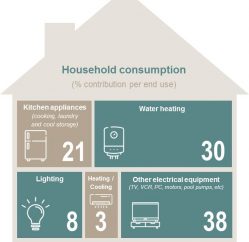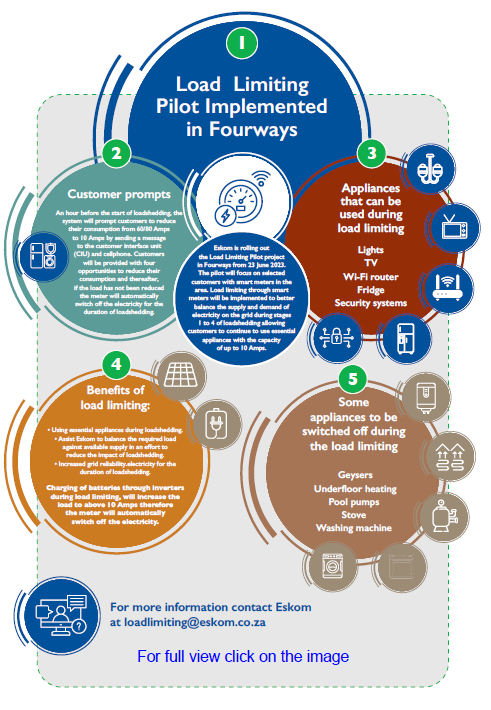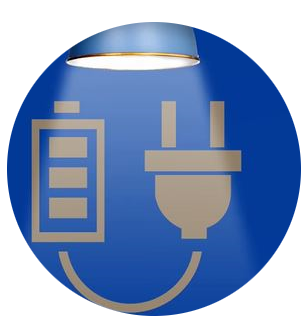
Demand Management Programme
Eskom is experiencing significant challenges in adequately balancing the national supply and demand of electricity and is regularly forced to implement load shedding to protect the power system. In response to the electricity challenges, Eskom Distribution has launched the Distribution Demand Management Programme (DDMP) to assist in the reduction of load shedding.
Invitation to participate:
Eskom invites project developers (PD) to submit project proposals as per the prescribed DDMP programme rules. The programmes are open to all that meet the qualification criteria whether supplied by a municipality or Eskom and are within the boundaries of South Africa.
The current programmes follow a performance contracting approach. Awarded contracts are provided with an incentive (Rand/MW or Cents/kWh) for achieved demand and/or energy reduction during specified periods. All approved proposals will be subject to an independent measurement and verification of the proposed baseline. Projects are to be financed upfront by the PD or customer. On completion, projects will be independently measured and verified quarterly against the contracted demand and energy savings.
Incentive rebates are then paid quarterly (eight quarters) for the savings realised over a 24-month sustainability term. The incentive rate for all DDMP performance contracting programmes is funded at a standard rate of 3 (three) Million Rand/MW. Payments are capped at 100% performance, therefore, no payments for overperformance. No double dipping/claiming with other incentive programmes will be permitted. Click here for Frequently Asked Question.
Below are the demand management programme solutions designed to achieve the desired energy and demand savings.
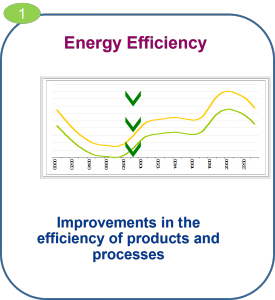
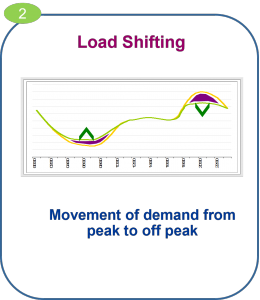
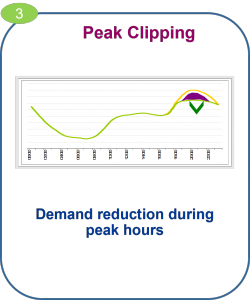
Industrial, Commercial and Agricultural Load Management
The objective of implementing the load management initiatives is to reduce demand during the constraint evening peak periods. Load Management projects contribute to flattening the system load profile by managing customer usage through clipping or shifting peak load. Industries would be required to manage their own activities without contravening health and safety requirements to achieve demand reduction.
The qualification conditions for project submissions are as follows:
- The programme is open to all sectors excluding the residential sector
- Minimum size of load shifting or peak clipping projects is 0.2MW
- Aggregation up to a maximum of 4 sites will only be applicable to commercial facilities of the same entity.
- Projects must be implemented within six (6) months
- The targeted demand reduction period is the Eskom-defined evening peak period for both summer and winter
- Performance will be measured quarterly over a 24-month sustainability term
- Proposal submissions are to comply with the required templates and documentation
Please refer to the detailed programme rules provided in documents below.
Click below for LOAD MANAGEMENT APPLICATION TEMPLATES:
For more information or clarity on Load Management send an email to [email protected] an Eskom representative will contact you.
The objective of the Residential Load Management (RLM) initiative is to shift evening peak demand to standard and off-peak periods. This plays a key role in reducing the demand during Eskom-defined evening peak periods in residential households. The systems assist project developers to shift the hot water demand during peak periods by remotely switching off residential customer’s geysers.
The criteria and conditions are as follows;
- Minimum size of residential load shifting projects is 1 MW
- Proposal submissions are limited to a single metro/municipality
- Projects must be implemented within 12 months
- The targeted demand reduction period is the Eskom-defined evening peak period for both summer and winter
- Performance measured quarterly over a 24-month sustainability term.
- Proposal submissions are to comply with the required templates and documentation
- For more information on Residential Load Management click here for FAQs
Please refer to the detailed programme rules provided in documents below.

Click below for RESIDENTIAL LOAD MANAGEMENT PROGRAMME DOCUMENTS:
Click below for RESIDENTIAL LOAD MANAGEMENT PROGRAMME APPLICATION TEMPLATES:
For more information or clarity on Residential Load Management send an email to [email protected] an Eskom representative will contact you.
Load Limiting Pilot
Make the smart switch, take control of your power usage, and enjoy the benefits of load limiting.
Load limiting is the demand management solution that allows Eskom to accurately determine available supply in relation to consumption in real time. Eskom will therefore alert smart meter households in Midrand and Sandton who are above the required consumption threshold to cut down their electricity usage.
To activate load limiting, a schedule is sent remotely to the meter during the beginning of the pilot and is set to expire after a pre-determined period. Customers are encouraged to switch off high consuming appliances like geyser, stove, washing machine and pool pump during this period. If such appliances are not switched off, the meter will disconnect supply for a period (configured) and display reasons on the meter for the disconnection. In this case the meter will display “Power overload”
Benefits of Load Limiting
- Potential reduction of loadshedding
- Continuation of essential appliances (lights, TV, cellphone and charger)
- Assisting the utility to balance the required load against available supply in an effort to reduce the impact of loadshedding
The energy efficiency programme is an incentive-based programme to allow customers to consider EE projects that they would otherwise not consider in the short term. The programme is designed as a win-win that offers customers the opportunity of lowering their electrical energy input cost and for Eskom to address the much-needed capacity issue in the short term respectively.
The qualification conditions for project submissions are as follows;
- The programme is open to all sectors, excluding the residential sector
- Projects are limited to a minimum average demand of 50 kW reduction of their consumption baseline measured between 6am and 8pm (14 hours) daily excluding weekends. The minimum energy savings applicable is 45 500 kWh/quarter
- Project proposals will be limited to a maximum of 30 sites of the same entity
- Projects must be implemented within six (6) months
- Performance measured quarterly over a 24-month sustainability term
- The incentive rate is 41,029 cents/kWh based on the average demand savings over the defined period
- Proposal submissions are to comply with the required templates and documentation
Please refer to the detailed programme rules provided in documents below.
Click below for ENERGY EFFICIENCY DOCUMENTS:
Click below for ENERGY EFFICIENCY APPLICATION TEMPLATES:
For more information or clarity on Energy Efficiency send an email to [email protected] an Eskom representative will contact you.
- Project developers are requested to submit proposals to the following email addresses
- The proposal submissions will be date stamped, and registered and the PDs will be notified via email
- The proposal will be submitted to the relevant Eskom clusters where a Project Manager will be appointed to vet and prepare the submission for presentation to the relevant approval committee
- Notification of the appointed Project Manager will be confirmed via email within 10 working days of project submission
Proposal approval process
The process flow diagram indicates the approval process from the proposal submitted to the management of the sustainability phase

Contact details:
- For more information on Load Management please forward an email to [email protected]
- For more information on Residential Load Management please forward an email to [email protected]
- For more information on Energy Efficiency please forward an email to [email protected]
Disclaimer: Eskom reserves the right to terminate or make changes to the DDMP programmes at any stage of the process, or if the PD/Customer is found to be in violation of the Prevention and Combating of Corrupt Practices Act, No 12 of 2004 (PRECCA), the Prevention of Organised Crime Act, No. 121 of 1998 (POCA), the Public Finance Management Act, No. 1 of 1998 (PFMA) and the Constitution.
The programme rules require that all customers participating in the programme be in good standing.
The DDMP Performance contracting models are hardwired EEDSM solutions, therefore an exemption is not applicable
Eskom will cover the cost of all the required M&V reporting. The required M&V equipment as determined by the M&V team will be for the project developer’s cost.
The DDMP Performance contracting models are hardwired EEDSM solutions, therefore an exemption is not applicable.
The rebate applicable is based on the verified savings. The risk of underperformance is not realizing the full benefit of the funding. The onus is on the project developer to ensure the performance is sustained during the contracted period.
All project proposals including the proposed technology needs to be signed off by the end customer.The Eskom evaluation team will assess the application to ensure all proposed technologies meet the necessary industry standards.
Yes, additional sessions will be scheduled during May and June 2023.
AMEU and SALGA to be informed, to ensure relevant people are made aware in the municipalities
Eskom Transmission has launched the Standard Offer Programme to purchase energy. The DDMP load management programme may be applicable if the proposed solution is for load clipping or load shifting. No double dipping will be allowed.
Eskom Transmission has launched the Standard Offer Programme to purchase energy. The DDMP load management programme may be applicable if the proposed solution is for load clipping or load shifting. No double dipping will be allowed.
The evening peak period is determined using the Megaflex evening peak hours. This does not preclude any other customer that is on another tariff from participating.
No double dipping is allowed, and this will include any other government incentive programmes.
Long-term lease properties will be considered to ensure the sustainability of the performance contract.
Municipalities are represented at the National Energy Crisis Committee (NECOM) with the intention of reducing the impact of load shedding.
Eskom will assist in engaging other stakeholders (IDC, DBSA and other financial institutions) for possible funding opportunities.
Eskom Transmission has launched the Standard Offer Programme to purchase energy. The DDMP load management programme may be applicable if the proposed solution is for load clipping or load shifting. No double dipping will be allowed. |
Yes, you can partner with more than one municipality, each municipality must have its own proposal submitted separately (minimum demand savings of 1MW)
This is a request for proposal, however, it is not a competitive procurement transaction hence there are no defined scoring criteria. Only submitted proposals will be evaluated in accordance with the programme rules that can be downloaded from the Eskom DDMP website.
Residential Load Management objective is to shift load from evening peak to standard and off-peak period during weekdays, whereas Demand Response is an arrangement with customers to shift the load on notice.
The submission of proposals will run over a period of two years from inception. If there are any changes, the industry will be notified.
Yes. Refer to the response to question one above.
For analysis purposes, the 24-hour load profile is required to assist the evaluation team on how the project developer will manage the system including the come-back load.
Yes, a letter of Intent and/or Council Resolution from the municipality is required.
Residential areas, whether a township or a suburb, as long as they have geysers.
The programme is specific to new projects. Retrospective funding is not applicable. The process requires independent M&V pre and post implementation.


